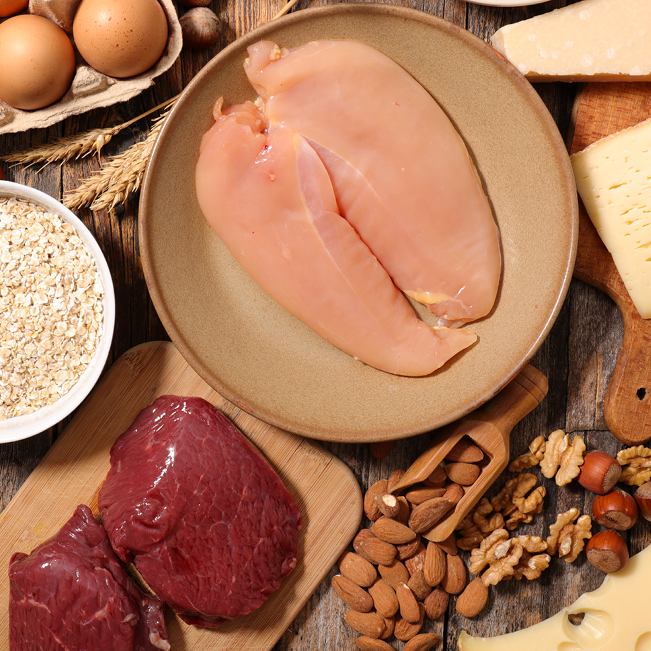
It can often be difficult to sort through nutritional guidelines in today’s advertisement-driven society. Everywhere we look, advertisements and labels highlight certain foods and still others advocate for various diet regimens. Do I choose the ketogenic diet? Should I follow a vegan diet? On the other hand, should I follow Dwayne “The Rock” Johnson’s meal plan and consume over 400 grams of protein each day? These are all valid questions that we ask ourselves every day in our pursuits to lose weight, build muscle, or just be healthier overall. One of the biggest questions we face surrounds a major dietary component: Protein. What exactly is protein and how much should we intake every day?
Proteins are large, complex molecules found in all living cells and are required for growth, development, and metabolism. Protein molecules are made from a combination of building blocks called Amino Acids, which we obtain through the food we eat. There are 20 amino acids; nine of which are essential, meaning they must be obtained through food. Examples include leucine, lysine, and valine. The other 11 are called nonessential, meaning the human body synthesizes them itself so they do not need to be consumed in food. These amino acids interact and bond together in numerous ways to form proteins for a variety of functions.
Protein serves many important functions in the human body. First, proteins are used for cell growth, repair, and maintenance. Cells in our bodies are constantly turning over; cells breakdown and proteins come in to fix or replace them. When lifting weights, muscle tissues are being torn and with a diet consisting of protein, those proteins can come in and fixed those “torn” cells in the muscle tissues. Even cells in the intestinal lining are replaced every 3-6 days. Other functions of proteins include:
- Act as enzymes and hormones
- Help maintain fluid and electrolyte balance
- Help maintain Acid-Base balance
- Maintain a strong immune system
- Serve as an energy source (after carbohydrates and fat have been depleted)
As you can see, protein serves an extremely important purpose in the human body. So now, how much do we need every day?
The recommended dietary allowance (RDA) for a sedentary person is .8 grams per kilogram (kg) of bodyweight or 0.35 grams per pound of bodyweight. The recommended percentage of energy/calorie that should come from protein is 10-35% of total caloric intake. Requirements change for different kinds of people and their activity level. The chart below describes those requirements:
Recommended Protein Intakes
Group Daily Protein intake (grams/kilogram of bodyweight)
Sedentary Adults .8 grams
Endurance Athletes 1.2 to 1.4 grams
Strength Athletes 1.2 to 1.7 grams
Vegetarian Endurance Athletes 1.3 to 1.5 grams
Vegetarian Strength Athletes 1.3 to 1.8 grams
Those 50 years of age and older 1.0 to 1.2 grams
*Sedentary refers to those who do little to no physical activity daily/minimum protein requirement
*Endurance refers to those who perform 150 minutes or more of cardiovascular exercise per week
*Strength refers to those who lift weights and do resistance training 3-5 days per week
To convert body weight from pounds to kilograms, simply divide weight in pounds by 2.2:
Example: 180 pounds/2.2= 82 kilograms
To get recommended daily intake of protein, multiply your kilograms by the protein recommendation:
Example: 82 kilograms X .8 grams (sedentary)= 66 Grams of protein per day
Sources of Protein
(Plant-Based Proteins)
Black Beans 8 grams per ½ cup
Almonds 7 grams per ¼ cup
Oatmeal 6 grams per 1 Cup
Tofu 10 grams per ½ cup
Hemp Seeds 10 grams per ¼ cup
Sunflower Seeds 6 grams per ¼ cup
Brussel Sprouts 4 grams per 1 Cup
Quinoa 8 grams per 1 Cup
Lentils 18 grams per 1 Cup
Peanut Butter 7 grams per 2 tbsp
(Animal-Based Proteins)
Chicken 21 grams per 3 oz.
Beef 21 grams per 3 oz.
Turkey 13 grams per 3 oz.
Salmon 22 grams per 3 oz.
Greek Yogurt 13 grams per 1 Cup
Bison 21 grams per 3 oz.
Shrimp 19 grams per 3 oz.
Eggs 6 grams per Large Egg
Cottage Cheese 13 grams per ½ cup
1% Milk 8 grams per 1 cup
Protein is an extremely important macromolecule that must be consumed each day for all bodily functions. Proteins repair all of our cells, drive hormones, and balance all fluids. These are the recommended daily requirements for protein that the general population can follow. Before making any changes to your diet, please contact your primary care physician, registered dietician, or licensed nutritionist.